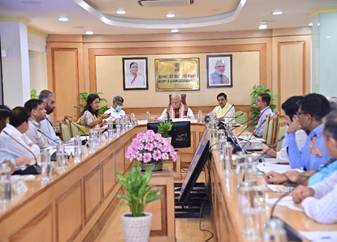Ministry of Housing & Urban Affairs
MoHUA issues Advisory for Repurposing of Smart City SPVs
Backs Strengthened Role for Smart Cities SPVs with crucial role in Urban Development
Building on the institutional framework and capacities developed through the Smart Cities Mission in 100 cities, the Ministry charts a forward-looking roadmap for SPVs in urban transformation.
Posted On:
10 JUN 2025 7:44PM by PIB Delhi
Launched in 2015, the Smart Cities Mission (SCM) marked a significant shift in urban development strategy by promoting city-level innovation and integrated infrastructure delivery. A distinctive feature of the Mission was the establishment of Special Purpose Vehicles (SPVs) in all 100 selected cities under the Companies Act, 2013, with a 50:50 equity share holding between State/UT governments/administration and respective Urban Local Bodies (ULBs) as promoters. These SPVs were mandated to implement the mission through focused planning, project development, and on-ground execution.

Hon'ble Minister Housing and Urban Affairs chairing a review meeting attended by State Urban Secretaries and CEOs of 100 Smart Cities
|
Over the past decade, SPVs have demonstrated the ability to deliver complex, multi-sectoral projects with agility and innovation. As of March 2025, over 93% of the 8,000+ projects under SCM have been completed, with the Government of India having disbursed nearly 99.44% of the Mission’s total budget outlay of ₹48,000 crore. In the process, the SPVs have cultivated a robust institutional capacity to manage high-value urban projects within short timelines while also contributing to the emergence of a skilled urban management workforce within the government systems.
Alongside SPVs, the Integrated Command and Control Centres (ICCCs) set up in all 100 cities under the Mission have emerged as the nerve centres of urban management, enabling data-driven governance and real-time decision-making. Leveraging cutting-edge technology, these centres have introduced significant improvements across various domains of urban practice, including traffic regulation, crowd management during high footfall events, public safety and security, disaster response and preparedness, and solid waste management. Thus, the States are encouraged to make optimal use of these enabling infrastructures by integrating additional city-level services and ensuring timely upgradation to enhance operational effectiveness.
Recognising the strategic investments made in establishing and strengthening SPVs and ICCCs, and their growing relevance in supporting Urban Local Bodies (ULBs) to address complex and evolving urban challenges, the Government of India is of the considered view that these entities should continue to operate beyond the completion of the Smart Cities Mission on 31.03.2025. To this effect, the Ministry has issued Advisory No. 27 outlining the envisioned future role of SPVs and a roadmap for the continued functioning of ICCCs.
The advisory outlines a two-fold approach: completing residual Mission responsibilities and defining the future roadmap for SPVs. As a first step, the advisory calls upon all SPVs to ensure the timely completion of all ongoing projects under the Smart Cities Mission, prepare detailed operation and maintenance (O&M) plans for the assets created under the Mission.
Looking ahead, the advisory underscores the Government of India’s firm view that the institutional and technical capacity built within the SPVs should be repurposed to meet emerging urban challenges. To support this transition, the advisory articulates a clear vision for repurposing SPVs as agile, multi-functional institutions aligned with evolving city and state-level priorities. States and Union Territories, through their respective High-Powered Steering Committees (HPSCs), have been encouraged to chart out urban sector priorities and map areas where SPVs can continue to play a strategic role. In doing so, the advisory outlines five broad domains for future engagement:
- Technology Support: SPVs may support ULBs in managing cyber hygiene, analytics, and data systems. ICCCs are to be leveraged as city operating systems and state analytical hubs, with operational control preferably retained by the urban development departments. SPVs may receive service-linked revenues for managing ICCC functions.
- Project Implementation: SPVs can act as implementing agencies for Central and State schemes, developing a pipeline of bankable projects. They may levy a project implementation charge between 1.5%–3%, as per state procurement norms.
- Consulting Support: SPVs may provide advisory support to ULBs and state departments across urban sectors, drawing on their institutional experience and sectoral expertise.
- Research and Assessment: SPVs can aid evidence-based planning through assessments, manpower/logistics support, and coordination. They may also serve as incubation hubs for urban technology start-ups.
- Investment Facilitation: SPVs are positioned to drive city-level economic development by supporting project structuring, procurement, and stakeholder coordination across tiers of government.
State Governments are requested to develop policies empowering SPVs charge a ‘Centage’ (Fee) from the State/UT to plan, design, develop and implement projects/Schemes of Center/State government in lieu of the functions and services delivered by them. This will thereby enable the financial sustainability and operational autonomy of the SPVs.
Accordingly, MoHUA has called upon States and UTs to take proactive steps to integrate SPVs and ICCCs into their long-term governance frameworks, ensuring that the gains made under the Mission continue to benefit urban India.
****
SK
(Release ID: 2135474)
Visitor Counter : 2